 Punters are being invited to get all interactive with the BBC’s TV and radio schedules as part of their Backstage experiment. The call to action was trumpted at the London hosted Open Tech grass roots conference that ran at the weekend.
Punters are being invited to get all interactive with the BBC’s TV and radio schedules as part of their Backstage experiment. The call to action was trumpted at the London hosted Open Tech grass roots conference that ran at the weekend.
As we reported in May, BBC’s Backstage project gives coders, computer program writers and graphics types the opportunity to bend and twist BBC digital content into new applications or Web-based prototypes that can be shared with others.
Developers and designers are now being asked to dream up innovative ways of using TV and radio schedules via a BBC competition.
“We want people to innovate and come up with prototypes to demonstrate new ways of exploring the BBC’s TV schedule,” said backstage.bbc.co.uk project leader Ben Metcalfe.
Metcalfe suggested that those taking part might be interested in combining schedules with Web search services, using online social bookmarking managers which let people collect, organise, and share their favourite Web links easily.
He also proposed that developers might like to fiddle about with the TV schedule data mixing it with other social elements, such as recommendation systems for friends and alert systems, or combining schedules with other Web data to serve up genre-based programme searches or listings.
 The BBC has already received more than 50 prototype ideas for using BBC feeds and content for non-commercial purposes since the project’s launch in May.
The BBC has already received more than 50 prototype ideas for using BBC feeds and content for non-commercial purposes since the project’s launch in May.
Backstage aims to tap into the resources of the distribution channels and knowledge networks already used by big companies such as Google and Yahoo, who were quick to realise the value of releasing content tool kits for developers to create applications with.
“Companies are waking up and realising that they need to have a conversation with their audience,” explained Mr Metcalf.
“The BBC has a good opportunity to take the lead in that, and others are realising it has its benefits too.”
The competition runs until 5 September, with the winner being invited to take the proposal forward with the BBC.
As we’d reported before, we think that Backstage is a great idea … we just wish they hadn’t used the word Remix – it’s really just a big too much, jumping on the blogging bandwagon. The idea is strong enough with having to resort do that.
 A British court has fined a man £500 ($870, €720) for using a residential wireless broadband connection without permission.
A British court has fined a man £500 ($870, €720) for using a residential wireless broadband connection without permission. We have to say this seems a little harsh as there appears to be no evidence that there was any hostile motive behind his actions.
We have to say this seems a little harsh as there appears to be no evidence that there was any hostile motive behind his actions. Champagne corks were firing off at Google like a military salute as the Internet search engine kings revealed that their profits had jumped more than 300 per cent in the second quarter this year.
Champagne corks were firing off at Google like a military salute as the Internet search engine kings revealed that their profits had jumped more than 300 per cent in the second quarter this year. The company’s fortunes are currently on a stratospheric trajectory, with April’s first-quarter profit almost six times higher than a year earlier.
The company’s fortunes are currently on a stratospheric trajectory, with April’s first-quarter profit almost six times higher than a year earlier. What with the summer in full swing, and the weather in the good old UK being as warm as it has been, I have observed some serious heat issues while using my Mac Mini.
What with the summer in full swing, and the weather in the good old UK being as warm as it has been, I have observed some serious heat issues while using my Mac Mini. At first, I had put it down to my Mac simply not running as well as it used to for whatever reason, but today it’s been considerably cooler because it’s rained, and all of a sudden my Mac Mini is running perfectly again.
At first, I had put it down to my Mac simply not running as well as it used to for whatever reason, but today it’s been considerably cooler because it’s rained, and all of a sudden my Mac Mini is running perfectly again.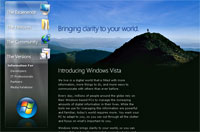 After a morning of fishwife-hot rumours, it’s been officially announced that the next version of Microsoft Windows – previously code-named Longhorn – will be known as Microsoft Vista.
After a morning of fishwife-hot rumours, it’s been officially announced that the next version of Microsoft Windows – previously code-named Longhorn – will be known as Microsoft Vista.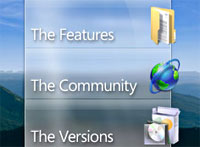 Possibly because of a fear of failing to release the product in the year bearing its name, Microsoft has once again shied away from its earlier practice of releasing dated operating systems (Windows95, Windows98 etc).
Possibly because of a fear of failing to release the product in the year bearing its name, Microsoft has once again shied away from its earlier practice of releasing dated operating systems (Windows95, Windows98 etc). The long-awaited results from the Welsh Digital TV trial were published today.
The long-awaited results from the Welsh Digital TV trial were published today.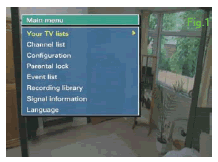 The digital signal was switched on in November 2004, running simultaneously with current analogue for three month.
The digital signal was switched on in November 2004, running simultaneously with current analogue for three month. Transmission and Coverage – No one lost their TV service during the trial. Only three homes, which were previously in poor reception areas, could not receive the digital service and these were given a digital satellite service. Broadband was introduced during the trial and is seen as an alternative form of delivery to satellite.
Transmission and Coverage – No one lost their TV service during the trial. Only three homes, which were previously in poor reception areas, could not receive the digital service and these were given a digital satellite service. Broadband was introduced during the trial and is seen as an alternative form of delivery to satellite. Content – Having an EPG went down well with the residents, particular when they used it to record programs on their PVR. The trialists also enthused about the ability to receive extra TV channels – after all the major benefit to consumer if the expanded choice they will be given.
Content – Having an EPG went down well with the residents, particular when they used it to record programs on their PVR. The trialists also enthused about the ability to receive extra TV channels – after all the major benefit to consumer if the expanded choice they will be given. The North American voice over IP (VoIP) market is about to go completely bananas, with phenomenal growth predicted for the next six years, according to a report by Frost & Sulllivan.
The North American voice over IP (VoIP) market is about to go completely bananas, with phenomenal growth predicted for the next six years, according to a report by Frost & Sulllivan. The VoIP’s operator’s joy could be the incumbent local exchange carriers (ILECs) misery, as Internet telephony represents a direct threat their market share and revenue.
The VoIP’s operator’s joy could be the incumbent local exchange carriers (ILECs) misery, as Internet telephony represents a direct threat their market share and revenue. The report concludes that it’s the quality of service and the VoIP feature set that’s attracting punters to the service rather than a desire to get in with the hi-tech crowd.
The report concludes that it’s the quality of service and the VoIP feature set that’s attracting punters to the service rather than a desire to get in with the hi-tech crowd. TV cables could provide broadband Internet access speeds up to a trouser-flapping 100 megabits per second as early as next year according to Finnish broadband equipment maker Teleste.
TV cables could provide broadband Internet access speeds up to a trouser-flapping 100 megabits per second as early as next year according to Finnish broadband equipment maker Teleste. “This is a cost-efficient technology, as we use the cable TV networks which are already in place,” Teleste’s CEO Jukka Rinnevaara told Reuters.
“This is a cost-efficient technology, as we use the cable TV networks which are already in place,” Teleste’s CEO Jukka Rinnevaara told Reuters. The foxy Finns are currently running field trials with cable TV service provider Essent in the Netherlands, but are yet to reach the top speeds they predicts will be available to most homes in a few years time.
The foxy Finns are currently running field trials with cable TV service provider Essent in the Netherlands, but are yet to reach the top speeds they predicts will be available to most homes in a few years time. Rissanen calculated the cost of connecting a home to the high speed ethernet-to-the-home technology could range from US$60.30 (~£35, ~€50) and US$241 (~£140, ~€200).
Rissanen calculated the cost of connecting a home to the high speed ethernet-to-the-home technology could range from US$60.30 (~£35, ~€50) and US$241 (~£140, ~€200). Feebly posing as some sort of independent study into the portable computer use, a recent US survey commissioned by Intel reveals that 34 per cent of respondents or their families have taken a laptop PC with them on vacation, with just over half likely to take a laptop PC on a future vacation. Oh that’s lucky … aren’t Intel involved with laptops in some way?
Feebly posing as some sort of independent study into the portable computer use, a recent US survey commissioned by Intel reveals that 34 per cent of respondents or their families have taken a laptop PC with them on vacation, with just over half likely to take a laptop PC on a future vacation. Oh that’s lucky … aren’t Intel involved with laptops in some way?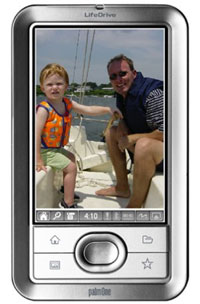 The growth of compact, wireless-enabled laptop PCs [cue: another plug for Intel Centrino here] and hotspots have made it easier for globe trotters to taunt their office-bound chums back home with beach photos, as well as keep in touch with work, news, sports and grab local information.
The growth of compact, wireless-enabled laptop PCs [cue: another plug for Intel Centrino here] and hotspots have made it easier for globe trotters to taunt their office-bound chums back home with beach photos, as well as keep in touch with work, news, sports and grab local information.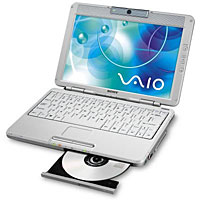 Of course, seasoned PC users have dragged laptops around with them for years on end, with many of the early adoptin’ cognoscenti choosing to travel even lighter by using PocketPCs/smartphones for keeping in touch while away from home.
Of course, seasoned PC users have dragged laptops around with them for years on end, with many of the early adoptin’ cognoscenti choosing to travel even lighter by using PocketPCs/smartphones for keeping in touch while away from home. The rurmour mill continues to hum with speculation that Apple are set to introduce a video playing iPod-like device in the near future.
The rurmour mill continues to hum with speculation that Apple are set to introduce a video playing iPod-like device in the near future.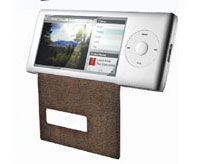 This has led to speculation that the company will be revising the iPod to create something like the ‘vPod’, a concept device created by design firm Pentagram which was published in Business 2.0 Magazine in March.
This has led to speculation that the company will be revising the iPod to create something like the ‘vPod’, a concept device created by design firm Pentagram which was published in Business 2.0 Magazine in March. The big problem with trying to create a multimedia device is that people demand quite different things for mobile audio and video.
The big problem with trying to create a multimedia device is that people demand quite different things for mobile audio and video.